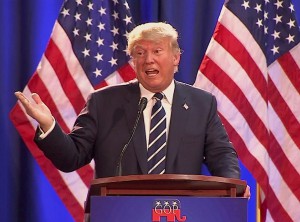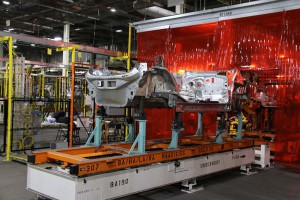General Motors is expected to announce a $1 billion investment in its U.S. factories on Tuesday, a move that will allow the nation’s largest automaker to create or retain about 1,000 American jobs, according to several sources. Specific details about where the investment will be targeted have not been disclosed yet.
The announcement will come exactly two weeks after President-elect Donald Trump threatened to impose a “big border tax” on GM for importing the hatchback version of its compact Chevrolet Cruze model from Mexico. And it follows other investment U.S. announcements made this month by cross-town rivals Ford Motor Co. and Fiat Chrysler Automobiles.
But GM sources stressed that the new investment by the automaker was not driven by the incoming president’s threats – a position echoed by GM General Counsel Craig Glidden in a story by the Wall Street Journal.
(Trump attacks GM. Click Here for the full story.)
Investment decisions of this magnitude and involving changes to manufacturing operations are typically the result of several years of study and require months of consideration by a company’s board of directors, noted David Cole, director-emeritus of the Center for Automotive Research, in Ann Arbor, Michigan, in a discussion this week. That would suggest that the latest GM investment project began as far back as 2014.
And it is just one in a string of investments announced by the automaker since emerging from bankruptcy in 2010. Overall, those have resulted in the addition or retention of of 25,000 American jobs, including 6,000 in the manufacturing sector.
That includes workers at the maker’s assembly plant in Orion Township, Michigan, where it produces the Chevy Sonic, a small car previously imported from South Korea. But due to shifting market demands, small car sales have tumbled and production has been cut at the suburban Detroit facility. GM hopes to boost operations there since adding production of the new Chevrolet Bolt EV on the same assembly line.
(Trump threatens Canada, Mexico, with new border tariffs. Click Here for the story.)
The issue of auto industry investments in the U.S. became politicized with Donald Trump’s entry into the 2016 political campaign. He quickly took aim at Ford for importing vehicles from Mexico, amping up his criticism last April when the nation’s second-largest automaker revealed plans to move all of its small car production to a new factory south of the border.
Early this month, Ford CEO Mark Fields announced the automaker was scrubbing the $1.6 billion plant, triggering self-congratulatory tweeting by Trump, even though Ford officials publicly noted they were still planning to move small car production to Mexico. They just decided to save cash by merging it into an existing, underutilized Mexican plant.
The president-elect also offered praise for Fiat Chrysler when it announced new U.S. investments in several Midwest factories – despite the fact that it had previously revealed the outline for that move which shifts production at two plants from slow-selling passenger cars to high-demand light trucks.
Trump’s attack on GM came as something of a surprise considering he had previously appointed the maker’s Chairman and CEO Mary Barra to his new economic advisory council. But he issued a tweet on January 3 warning, “Make in U.S.A. or pay big border tax,” a reference to the Chevy Cruze. In fact, only a few thousand of those hatchbacks are imported from Mexico. The bulk of the Cruze volume – all of the compact sedan versions – are produced in the U.S.
Nonetheless, following news of the FCA and Ford moves, Trump declared at his news conference last week, “General Motors will be following, and I think they will be.”
For her part, Barra told reporters at the North American International Auto Show last week that GM will not alter its manufacturing plans to please the new president. It will continue to make investments that reflect its overall global strategy. That will include projects in the U.S. and abroad, including possible future efforts in Mexico.
The president-elect’s threats to revise, or even dismantle, the North American Free Trade Agreement has earned him an unlikely ally. Though the United Auto Workers Union supported Trump’s opponent, Hillary Clinton, in the presidential race, it is backing efforts to kill NAFTA, U.S. auto workers seeing it as a factor in the decline of American manufacturing jobs. But a study released last week by the Center for Automotive Research warned that eliminating the trade pact would actually have the reverse effect, eliminating as many as 31,000 American auto jobs.
(For more on that new NAFTA/auto jobs study, Click Here.)



